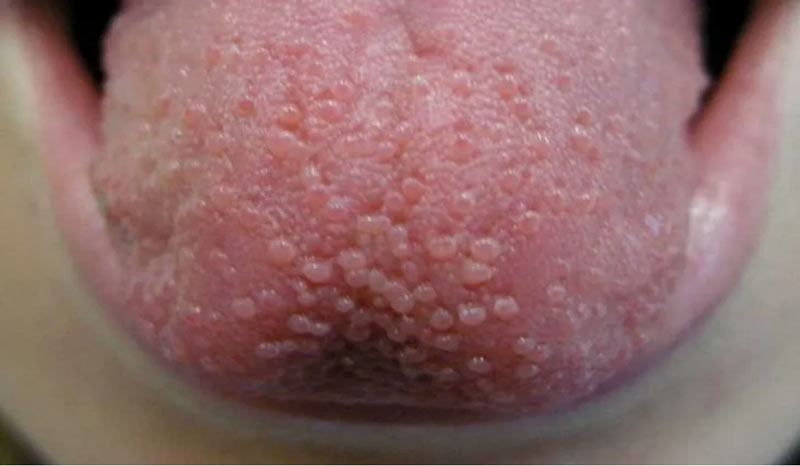
If you've ever experienced a swollen tongue, you know how uncomfortable and frightening the condition can be. The good news is that, though a swollen tongue can cause some serious distress, it is typically caused by an underlying issue that can be easily addressed.
In this blog post, we'll take a closer look at what causes a swollen tongue and discuss treatments available for those who may encounter this issue in their own lives. Before we dive into the specifics of what causes a swollen tongue and the treatment options available, let's answer one key question: What happens when one experiences tongue swelling?
Symptoms Swollen Tongue
A variety of other symptoms often accompany a swollen tongue. These can include but are not limited to:
Difficulty Swallowing
An inability to swallow due to the discomfort caused by a swollen tongue can be a serious health hazard. If you are unable to swallow, seek medical help immediately.
Difficulty Talking
The swelling of the tongue can make it difficult to talk or even impossible in some cases. The swelling may also cause slurring of words and an altered speaking voice.
Loss of Taste
Tongue swelling can cause a temporary loss of taste or altered taste. This may manifest as an inability to distinguish between different foods or to detect flavors altogether.
Pain While Eating and Swallowing
The difficulty and discomfort caused by the swollen tongue can be painful when eating and swallowing.
The feeling of a Lump in the Throat
The feeling of a lump in one's throat is common with tongue swelling, as it can cause difficulty breathing and swallowing.
Change in Voice Quality or Pitch
Swelling of the tongue can alter a person's speaking voice, causing pitch and vocal quality changes.
Visible Swelling
The tongue may be visibly swollen due to the accumulation of fluid or tissue in the area. This can manifest as redness or discoloration of the tongue.
White Patches on the Tongue
White patches on the tongue are another sign of tongue swelling, typically caused by an accumulation of fluid or tissue.
Bad Breath
Tongue swelling can cause bad breath due to the build-up of bacteria and other debris in the area.
Drooling
The difficulty swallowing associated with tongue swelling can cause excess saliva to accumulate, resulting in drooling.
Causes of a Swollen Tongue
Several issues can cause a swollen tongue, some more serious than others. Let's take a look at the 10 most common causes:
Allergies
Allergic reactions to food or medication can cause tongue, lips, and face swelling. This type of reaction should be addressed immediately.
Oral Infections
Infections in the mouth can cause tongue swelling due to inflammation and the build-up of fluid or tissue.
Trauma from Biting or Burning
Accidental biting or burning of the tongue can cause it to swell up as part of the body's natural healing process.
Endocrine Disorders
Certain endocrine disorders can cause the tongue to swell due to hormonal imbalances.
Systemic Diseases
Systemic body diseases, such as lupus and diabetes, can cause tongue inflammation.
Nutrient Deficiency
Deficiency in certain vitamins and minerals can cause the tongue to swell due to a lack of nutrients.
Dehydration
Dehydration can cause tongue swelling due to the body's inability to produce enough saliva.
Oral Cancer
In rare cases, oral cancer can cause tongue swelling as part of its natural progression.
Acid Reflux
Acid reflux can cause tongue swelling due to irritation caused by stomach acid.
Medications
Certain medications, such as antibiotics and antifungals, can cause tongue inflammation. If this occurs, speak with your doctor about possible alternatives.
Treatment for Swollen Tongue
Treatment for a swollen tongue will depend on the underlying cause. If an infection is present, antibiotics may be prescribed to address it. For allergies, antihistamines can help reduce swelling and discomfort.
Your doctor may prescribe vitamins or minerals as needed in cases of trauma or nutrient deficiency. If acid reflux is the culprit, medications to reduce stomach acid can help. Additionally, there are a few home remedies that may provide relief from tongue swelling and discomfort. These include:
Cold Compresses
Applying cold compresses to the tongue can reduce inflammation and swelling. Use a thin layer of cloth between the compress and your tongue to avoid burns or other injuries.
Salt Water Rinse
Mixing a teaspoon of salt in 8 ounces of warm water and rinsing gently can help reduce swelling. Do not swallow the mixture; swish it around your mouth for 30 seconds before spitting it out.
Oral Steroids
Your doctor may prescribe oral steroids to reduce inflammation. These should only be used under medical supervision as they can have serious side effects when taken incorrectly.
Avoid Hot or Spicy Foods
Eating hot or spicy foods can further irritate the tongue and worsen the swelling. Soft, cool foods such as yogurt, applesauce, and mashed potatoes are recommended.
Reduce Stress
Stress can exacerbate inflammation and swelling of the tongue, so it is important to manage stress levels. This can include deep-breathing exercises, yoga, meditation, or any other relaxation technique that works for you.
Diagnosis of a Swollen Tongue
Diagnosis of a swollen tongue will involve a physical exam and medical history from your doctor. Your doctor may order blood tests or imaging scans to confirm the diagnosis. If underlying conditions are discovered, further testing and treatment options may be recommended by your doctor. Treatment for tongue swelling will depend on the cause; however, in most cases, the swelling should subside within a few days.
Suppose you experience tongue swelling that does not improve or worsen over time. In that case, speaking with your doctor as soon as possible is important to rule out any underlying medical conditions. Treatment for these conditions can help reduce and eliminate any discomfort caused by a swollen tongue. With proper diagnosis and treatment, relief from a swollen tongue is possible.
FAQs
What is the best way to reduce swelling of the tongue?
The best way to reduce tongue swelling is to identify and address the underlying cause. This could include taking antibiotics for an infection, antihistamines for an allergy, or oral steroids prescribed by your doctor to reduce inflammation. Some home remedies may also provide relief, such as cold compresses and a saltwater rinse.
Should I see my doctor if my tongue is swollen?
It is important to see your doctor if you experience persistent or worsening tongue swelling. Your doctor can help identify the underlying cause and recommend treatment options. It's also important to seek medical attention promptly to rule out any serious conditions that may be causing the swelling.
Are there any risks associated with a swollen tongue?
Risks associated with a swollen tongue include difficulty breathing, choking, and loss of consciousness. It is important to seek medical attention promptly if you experience any of these symptoms to prevent serious health complications. Additionally, untreated infections or allergies can cause further damage if left untreated.
Conclusion
A swollen tongue can be an uncomfortable and even frightening experience, but understanding the causes and available treatments can help you address it quickly and effectively. Knowing what to expect when dealing with a swollen tongue can make the process less daunting and provide you peace of mind that relief is possible. If you experience tongue swelling, consult your doctor for diagnosis and treatment options. By addressing the issue early on, you can minimize any discomfort caused by a swollen tongue.
-
Recommended Reading





